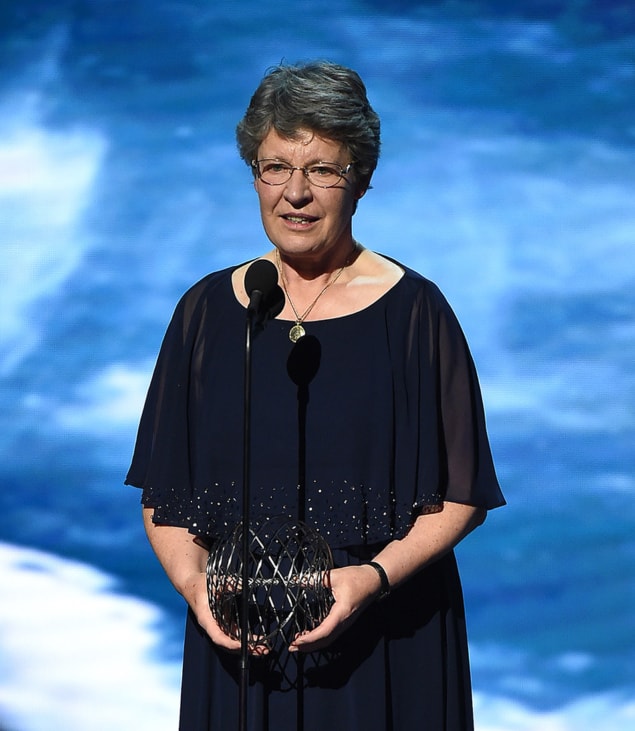Jocelyn Bell Burnell talks to Matin Durrani about the launch of the new Bell Burnell Graduate Scholarship Fund, run by the Institute of Physics, to boost diversity in physics departments in the UK and Ireland

The fund has been made possible thanks to you being awarded last year’s $3m Special Breakthrough Prize for the discovery of pulsars. How did you hear you’d won?
I had a phone call from Ed Witten, chair of the [prize] committee, whom I know from teaching his daughter physics at Princeton. I’m not usually speechless but I was on that occasion because this prize just wasn’t on my radar. I hadn’t ever assumed it would be anything to do with me.
Was the prize ceremony as glitzy as it looked online?
They describe it as the “Oscars of science”. You walk in along this red carpet with photographers and press lined up along one side and flashes going off all the time and you stop every so often to answer questions. Yes, it was glitzy – fanfares, swirling lights, music, film stars. Pierce Brosnan was doing the continuity.
So who is the Bell Burnell Graduate Scholarship Fund aimed at?
The fund will give PhD students in physics departments in Britain and Ireland extra money for things they might need help with. They will already have the standard PhD studentship from whichever university they’re hoping to – or going to – attend. It’s a top-up fund to help them because some of them might have young children, or disabilities or visa issues.
How will the scheme be run?
The Institute of Physics (IOP) has agreed to administer the whole thing, which is fantastic, and a panel is being appointed to judge applications. The rules are being formulated and they look pretty good (see box below), but the idea is that no more than one [PhD student will be funded] per university per year. I’m sure over the first few years it’ll evolve and we’ll reach a steady-state about five years in.
What are the benefits of making universities more diverse?
Diversity strengthens a place. There are echoes of my own PhD studentship because I turned up at the University of Cambridge [in 1965] as one of the few women there and one of the few people not from the south of England. It felt alien and I wasn’t sure I was going to make the grade, so I worked very hard. That’s how the discovery of pulsars came about. I have this maybe vain hope that by increasing the diversity in physics departments, there’ll be more people who feel a bit unconventional, out of the normal mould, working like the clappers, thinking a little differently and maybe finding things.
Has improving diversity been on your mind for a while?
I’ve been concerned about the shortage of women in physics for a very long time. I’m one of the founders of the Athena SWAN scheme [to support diversity in universities], which started with women in science and has now expanded a lot. But I never thought I’d have this kind of money, so it was all a bit hypothetical. It would be nice to enable those who want to – refugees and people from minority and other under-represented groups – to stay on and do PhDs.
Would a fund like this have helped when you were a student?
In my case, I probably didn’t need the money, but I needed assurance that people like me could do PhDs. This kind of fund says it’s not just middle-class white males who do PhDs in physics.
Do you foresee criticism from those white, middle-class male physicists who might wonder why they can’t be supported by the fund?
Yes. But they are in the majority and I think if they look around a physics department they can see they’re in the majority. The Bell Burnell Graduate Scholarship Fund is not going to deprive anybody. It is more of a top-up of an existing studentship.
You’ve been as closely involved with astronomers as physicists. Were you ever tempted to award the money to the astronomy community?
Actually, as far as women go, there are a lot of women in astronomy compared with the rest of physics. Astrophysics is already more diverse than the rest of physics, so I thought going through the IOP was probably a better bet. Besides, it will reach a larger cohort of people as well.
What’s been your reaction to recent high-profile cases of sexual misconduct in astronomy?
My main reaction is: how long has it taken to come to any point of action? It’s probably affected generations of students, but times are changing.
Did you suffer any discrimination?
When I was an undergraduate [studying physics at the University of Glasgow], it was the “tradition” that when a woman entered the lecture theatre, everybody whistled and stamped and catcalled and banged the desk and made as much noise as they could. I was the only female in the honours physics class, so I had to face that on my own. It wasn’t nice.
What made you carry on despite those difficulties?
I knew I wanted to do a PhD in radio astronomy and getting a physics degree was the first step in that.
‘Look happy dear, you’ve just made a discovery’
‘Look happy dear, you’ve just made a discovery’
With the Breakthrough Prize being so big financially, do you think the prestige of the Nobels is ebbing away?
It’s being challenged. Breakthrough is not the only big prize. There’s the Shaw prize in mathematics, the Kavli prize in astrophysics. There are now four, five, six big prizes like that, all of which aim to thumb a nose at the Nobel. They go about things in a slightly different way and they reach, probably, a slightly different audience. But the Nobel prize is limited by [Alfred] Nobel’s will so they don’t have a lot of room for manoeuvre.
Why do you think it took until last year for only the third woman – Donna Strickland – to win a Nobel Prize for Physics?
Physics is getting more diverse. But it takes time for these changes to work through. One problem is that the prize is awarded to a maximum of three people because it was set up when the perception of the way we did physics, and maybe all science, was that there was a senior man or two and a fleet of minions under them who didn’t count. These days we work much more in teams. That’s going to make it more and more difficult for [the Nobel committee] to do justice to work that’s done.
What have you been up to since winning the Special Breakthrough Prize?
I’m doing quite a lot of lecturing. In fact, I have far more invitations than I can manage.
Looking back on your career – if you were a student now, would you still go into astrophysics?
Undoubtedly, yes.
The Bell Burnell Graduate Scholarship Fund
What is the fund?
Managed by the IOP, it supports full- or part-time graduate studentships for people from groups that are currently under-represented in physics.
Who can apply?
PhD students studying a physics-related topic at a recognized graduate degree-awarding institution in the UK and Ireland. They must also be in a physics department, school or faculty that has a Juno or Athena SWAN award.
How are “under-represented” groups defined?
The definition will be kept under review, but in this first instance it includes: women; students of Black-Caribbean, Black-African and other minority ethnic heritage; students who require support for disabilities or inclusive learning; LGBT+ students; and those from disadvantaged backgrounds struggling to complete their studies. People with qualifying refugee status who meet the above criteria are also encouraged to apply.
What will the scholarships cover?
They will normally be paid to support course fees, living support grants and any additional funding to support accessibility, including carer responsibilities.
How will students be selected?
By a small panel convened each year by the IOP. Priority will be given to students who meet multiple criteria.
How much funding will each student receive?
This has not yet been decided.
How long will funding last for?
As a contribution for up to four years (or equivalent if by part-time study) of PhD studies.
How will students receive funds?
Funds will be paid annually and will be tied to the student, so if they move university, the funding will move with them.
Further information about the fund – and details of how to register your interest – can be obtained here.
This interview with Physics World (published online on 19 March 2019) may be reused by media outlets with the credit ©Physics World/IOP Publishing Limited 2019. All other rights are reserved. For further enquiries about reusing the interview please contact Physics World at pwld@iop.org.




